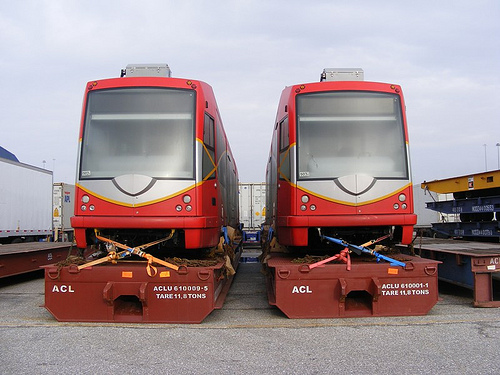Back in December, Clackamas, Oregon-based United Streetcar won an $8.7 million contract to build two vehicles for Washington, DC’s streetcar system, currently under construction. The timing could not have been better for House Transportation and Infrastructure Committee Ranking Member Nick Rahall, who had just introduced legislation to tighten “Buy America” requirements on future transportation investments. Rahall had even invited United Streetcar’s president, Chandra Brown, to speak at the press conference, to demonstrate how Buy America can benefit and revive the domestic rolling stock manufacturing industry.

But this week, the District Department of Transportation has withdrawn the award, in response to a complaint filed by a competing bidder. As the Washington Business Journal reported yesterday:
[Czech company] Inekon built the District's first two streetcars. It offered to build the next two, slated to run on the H Street/Benning Road line, for $9.5 million. While its bid was higher than United Streetcar's, Inekon argued in its protest that the winning contractor's low technical score should have ruled it ineligible for the award.
Railway Age Magazine reports that United Streetcar’s Brown has “received no formal notice of the cancellation of our contract” according to a statement.
The decision could certainly be a setback for DC, but it could have national policy implications as well. Rep. Rahall’s Buy America proposal would require 100% of transit rolling stock components to be American-made by 2016. But United Streetcar is still the only domestic streetcar manufacturer, and if its “low technical score” in DC does indeed disqualify it, then other budding streetcar networks will surely take notice. (While it's not clear exactly how the United Streetcar product failed to measure up, Inekon accused the company of failing to meet specifications in the city's request for proposals.)
And there are plenty of streetcar networks in building or planning stages across the country. In today’s Fast Lane Blog post, U.S. Secretary of Transportation Ray LaHood showered praise on Dallas, Atlanta, Salt Lake City, Tampa, Cincinnati, and Tucson -- another United Streetcar client -- saying, “this streetcar revival means greater mobility and more American jobs. DOT will continue to improve public transit services by supporting these critical projects...” (LaHood's remarks coincide with the start of the first ever American Streetcar Conference in Portland, OR.) The possibility remains, however, that USDOT’s support for streetcar expansions could be complicated by Congress’s own attempts to ramp up Buy America requirements.
Read the Washington Contract Appeals Board's decision on DDOT here [PDF].





